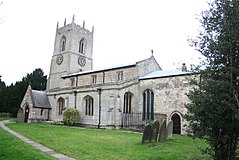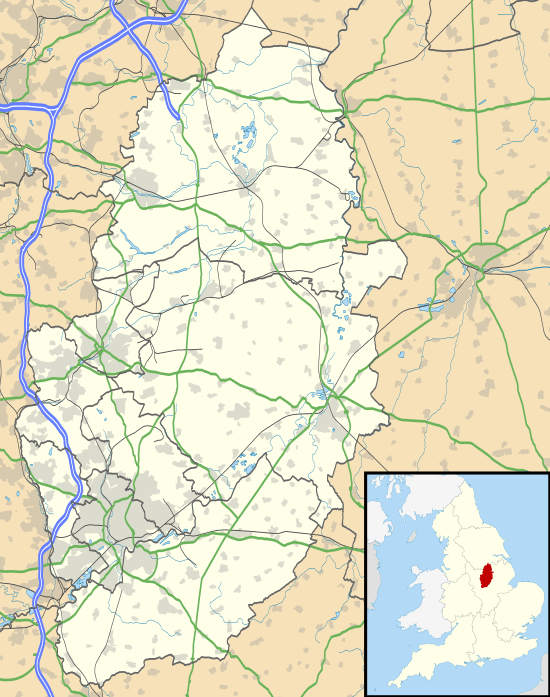Beckingham, Nottinghamshire
Beckingham is a village and civil parish in the Bassetlaw district of Nottinghamshire, England, about 3 miles west of Gainsborough, Lincolnshire. According to the 2001 census it had a population of 1,168, reducing to 1,098 at the 2011 Census.[1]
| Beckingham | |
|---|---|
 All Saints' Church | |
 Beckingham Location within Nottinghamshire | |
| Population | 1,098 (2011) |
| OS grid reference | SK7890 |
| District | |
| Shire county | |
| Region | |
| Country | England |
| Sovereign state | United Kingdom |
| Post town | DONCASTER |
| Postcode district | DN10 |
| Dialling code | 01427 |
| Police | Nottinghamshire |
| Fire | Nottinghamshire |
| Ambulance | East Midlands |
| UK Parliament | |
History
The parish church of All Saints is mostly of the 13th century, though the exterior is apparently 15th century. The west tower has buttresses, battlements, gargoyles and pinnacles. There is a north chancel chapel and sedilia.[2] It is a Grade II* listed building.[3]
A tower windmill was built some time prior to 1840 to the north of the village (grid reference SK772904). The tower was straight-sided. In 1841 the mill had 2 pairs of millstones driven by 4 common sails, described as "self-regulating cloth and rollers to the sails". By 1850 the mill had been fitted with a pair of patent sails, retaining one pair of rollers; these drove 3 pairs of millstones.
To be Sold to the beſt Bidder; On Thurſday the Eleventh Day of September 1777, between the Hours of Five and Seven in the Afternoon, at the Marquis of Granby in Gainſburgh, in the County of Lincoln. A Well Accuſtomed Corn WIND MILL, ſituate at Beckingham in the County of Nottingham, with a Dreſſing Mill therein. and the Ground whereon the ſame doth ſtand, with a new erected Brick and Tile Dwelling Houſe, Barn, and Stable to the ſame belonging and adjoining. For further Particulars enquire of Leonard Billet
the Tenand, who will ſhew the Premiſſes.Stamford Mercury 21 Aug. 1777 p.4 col.1
Beckingham Marshes
Beckingham Marshes is a RSPB nature reserve. Nearby there is a crude oil and gas production field run by IGas Energy. The wells in the field where fracked using the older less controversial technique.[4]

See also
References
- "Civil Parish population 2011". Neighbourhood Statistics. Office for National Statistics. Retrieved 5 April 2016.
- Pevsner, N. (1951) Nottinghamshire. Harmondsworth: Penguin; p. 34
- Historic England. "Church of All Saints (1045129)". National Heritage List for England. Retrieved 31 July 2020.
- Lowbridge, Caroline. "Fracking confusion: How UK has been 'fracked' for decades". BBC. Retrieved 23 August 2013.